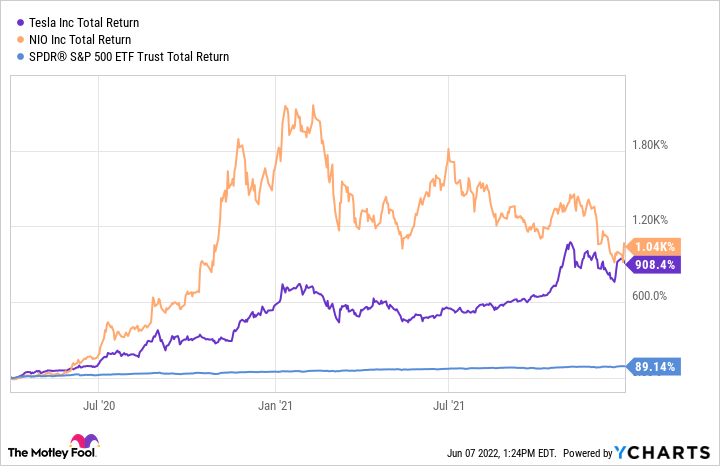Many investors are excited about the prospects of the electric vehicle (EV) industry, with battery-powered transportation helping combat climate change. The adoption of EVs is underway, and along with the rapid rise of Tesla (TSLA 4.96%), the sector turned into an investment craze in 2021.
But now, in the middle of 2022, much of that enthusiasm has waned, with share prices down considerably from all-time highs, potentially providing a buying opportunity for long-term investors. Let's see whether now is the right time to buy some EV stocks.

Image source: Getty Images.
The rise and fall
It is unclear exactly why investors got so excited about EV stocks, but the excitement went into overdrive coming out of the March 2020 market lows. For example, both Tesla and Nio (NIO -0.48%) soared over 1,000% from March 2020 to the end of 2021, greatly outpacing the S&P 500's 89% total return during that span.
TSLA total return level. Data by YCharts.
The majority of these gains were not due to fundamental growth for these two businesses. While gross profit per share grew around 100% for Tesla and 192% for Nio over this period, most of that growth was due to multiple expansions, with both stocks' price-to-sales ratios (P/S) hitting 30 in early 2021. The typical automotive manufacturer trades at a P/S closer to 1.
In late 2020 and throughout 2021, many EV companies went public with much fanfare on the back of this hype, driving initial public offering (IPO) share pops not seen since the dot-com bubble in 2000. There's no better example than Rivian Automotive, an EV manufacturer whose stock was valued at over $100 billion when it had not yet produced one vehicle.
Now in 2022, EV stocks have declined significantly. All major EV companies are trailing the S&P 500 to start the year, with stocks down 30% or more in just a few months' time. Rivian, the most egregiously valued of the group, has seen its shares lose 72% of their value this year.
TSLA total return level. Data by YCharts.
The secular tailwind is strong
There's no doubt that EV investors were right about the huge opportunity in the industry. Automotive analysts are expecting global EV sales to reach $800 billion a year by 2030, making it one of the largest industries in the world. With over 60 million new cars sold around the world each year and the average price of a new car in the tens of thousands of dollars, you can see why so many companies are investing in the EV space -- the opportunity is massive.
Plus, with many governments around the world incentivizing businesses to transition to EV manufacturing, humanity as a whole has decided to make the transition. Gasoline-powered vehicles don't stand a chance and will likely be a tiny portion of the market within a few decades, if not sooner.
So with the stocks down but the long-term opportunity intact, that should make the stocks a buy, right? Not so fast...
Why I'm still staying away
Even though a ton of EV stocks are down from their highs, that doesn't necessarily make them a buy. There are two main reasons I'm staying away from these companies as potential investments.
First, the automotive business has proved over the last 100-plus years to be incredibly competitive and hard to win at. Only two automakers in the U.S. have never declared bankruptcy or just folded (Tesla and Ford), which is due to the cyclicality and capital intensity of car manufacturing.
In the early 20th century, dozens of carmakers sprung up in the initial automotive revolution, but the majority failed because of how hard it is to keep the businesses running through down cycles. It feels likely that this will occur with EV manufacturers in the coming decades, and I'm not comfortable predicting which few will be winners.
TSLA price to free cash flow. Data by YCharts.
Second, the stocks are still valued richly compared to legacy automakers. For example, Tesla trades at a price to free cash flow (P/FCF) over 100, while Ford only trades at a P/FCF of 13.8. Tesla might grow more quickly than Ford, but it's not like the legacy carmaker is sitting down and watching the EV revolution pass it by.
Ford is investing tens of billions of dollars into EV manufacturing this decade, along with investments from other huge manufacturers like Volkswagen and Toyota, which will greatly increase the competition for consumer spending. This adds risk for investors in pure-play EV stocks, especially ones trading at sky-high earnings multiples.
The EV revolution is definitely underway. But that doesn't mean all the stocks are guaranteed to be good investments.








